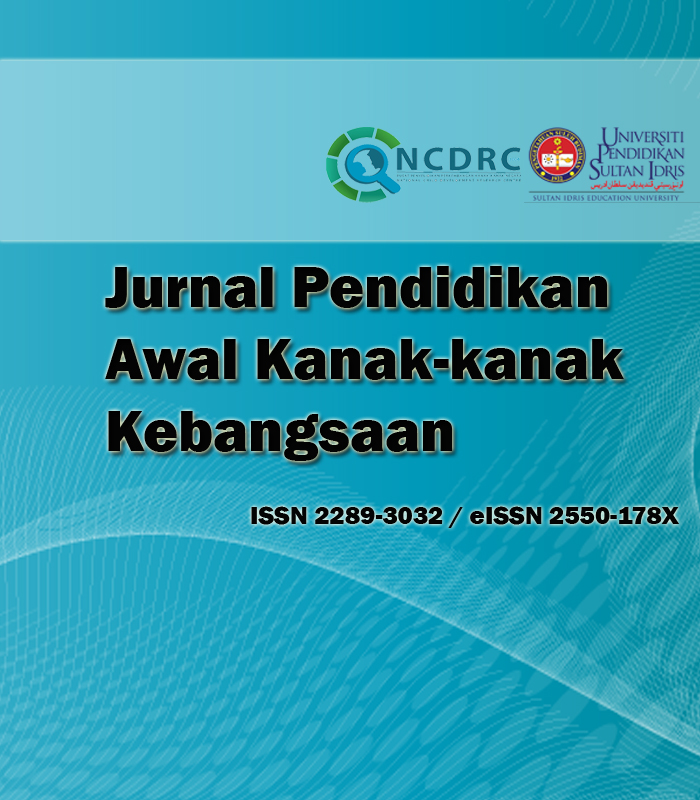Teachers' socio-emotional knowledge in nurturing the morals of children after the COVID-19 Pandemic
DOI:
https://doi.org/10.37134/jpak.vol13.2.10.2024Keywords:
Socio-emotional Knowledge, Moral, ChildrenAbstract
Preschool teachers in Malaysia face problems in teaching socio-emotional components due to a lack of teaching aids, structure, and specific guidance. This study aims to identify teachers' socio-emotional knowledge in fostering children's morals after the COVID-19 pandemic. This study uses a quantitative approach where questionnaires are used as research instruments to collect data. This study was conducted on 124 teachers of TABIKA PERPADUAN in Perak and Selangor. The data were analysed using the Statistical Package for Social Science Version 27 (SPSS 27). The findings of the study showed that 75.0% of teachers created stimuli in teaching and learning that encouraged socio-emotional development in nurturing children's morals; 71.8% of teachers took into account the factors that influenced children's socio-emotional skills in nurturing children's morals; 67.7% of teachers used teaching methods that focused on aspects of socio-emotional skills in nurturing children's morals; 66.9% of teachers implemented socio-emotional skills to nurture children's morals; 66.1% of teachers detected the levels of mastery of socio-emotional skills in nurturing children's morals; 64.5% of teachers applied elements of socio-emotional skills that are appropriate to nurture children's morals and provided feasible activities to help develop children's socio-emotional skills. In addition, only 62.9% of teachers mastered the socio-emotional skills that need to be included in teaching to nurture children's morals; 62.1% of teachers used appropriate socio-emotional skills strategies in fostering children's morals; and 58.1% of teachers attached importance to measures to build socio-emotional skills to nurture children's morals. In conclusion, TABIKA teachers have good socio-emotional knowledge in nurturing children's morals after the COVID-19 pandemic. Next can have a positive impact in the implementation of teaching and learning integration of socio-emotional skills in TABIKA.
Downloads
References
Ahmad Firdaus Mohd Noor, Kamarul Azmi Jasmi, & Khairunnisa, A. S. (2018). Masalah sosial dalam kalangan pelajar dan peranan pensyarah pendidikan islam dalam pengajaran dan pembelajaran. e-Bangi, 13(5).
Brackett, M. (2019). Permission to feel: Unlocking the power of emotions to help our kids, ourselves, and our society thrive. Celadon Books.
Bronfenbrenner, U. (1979). The ecology of human development: Experiments by nature and design. Harvard University Press google schola, 2, 139-163.
Guide, C. A. S. E. L. (2013). Effective social and emotional learning programs. Preschool and Elementary School Edition.
Hidayu, F., & Vasudevan, H. (2020). Covid-19 Pandemic during 2020 Malaysia Movement Control Order (MCO)-The Case Of Residential College Students’ Mental Health. International Journal of Social & Scientific Research, 6(11).
Kohlberg, L. (1984). Essays on moral development, Vol. II, The psychology of moral development. San Francisco, CA: Harper & Row.
Mohamed, S. (2021). Pembelajaran Sosioemosi Di Prasekolah: Tahap Pengetahuan dan Amalan Guru. Jurnal Dunia Pendidikan, 3(2), 401-408.
Mohammad, N. A., & Mohamed, S. (2020). Analisis keperluan pembangunan modul pembelajaran dalam membentuk kecerdasan sosioemosi kanak-kanak. International journal of education and pedagogy, 2(3), 70-82.
Nor Hamizah Ab Razaki & Abdul Rashid Aziz @ Dorashidi. (2020). Perkembangan sosial dan emosi kanak-kanak: Kesan penjarakan sosial dalam tempoh perintah kawalan pergerakan dan pendekatan dalam membantu. International Seminar on Islam And Science 2020, 448-445. https://oarep.usim.edu.my/jspui/handle/123456789/6841
Oliveira, S., Roberto, M. S., Pereira, N. S., Marques-Pinto, A., & Veiga-Simão, A. M. (2021). Impacts of social and emotional learning interventions for teachers on teachers' outcomes: A systematic review with meta-analysis. Frontiers in Psychology, 12, 677217.
Santrock, J. W. (2019). Life-span Development. United Kingdom: McGraw-Hill Education.
Sekaran, U. (2000). Research Methods for Business (3, d Edition). New Jersey: John Wiiey & Sons.
Shahbudin, M. S. I. (2020). Kepanikan pengguna media sosial terhadap virus COVID-19. PENDETA, 11, 1-10.
Downloads
Published
Issue
Section
License
Copyright (c) 2024 Zaharah Osman, Anis Norma Mohamad Jaafar, Nor Aizal Akmal Rohaizad

This work is licensed under a Creative Commons Attribution-NonCommercial-ShareAlike 4.0 International License.





